
Ever since relocating to Austin last summer, I'd kept one eye on the live-music/film-premiere/interactive behemoth South By Southwest. This year was to be my first, and as a veteran of CMJ Music Marathon and a pioneer at Brooklyn's first-ever Northside Festival, I was beyond stoked. But between work trips to NYC and Tokyo, culminating in a three-week sojourn to the Big Apple this past month, time slipped by. On my late-night flight back to Austin last Wednesday, surrounded by skinny blokes with guitar cases and European accents, I realized—Oh snap, South By Southwest!
I had to attack this beast badgeless and wristbandless, with a major NYC hangover and little schedule in mind besides what I'd culled fromBrooklynVegan and various Facebook invites. Luckily, Japanese art-punksPeelander-Z were hosting a free day-show of caffeinated awesomeness called “Peelander-Fest.” It featured a solid mix of Japanese acts (like the Motörhead-ish Electric Eel Shock) and yanks, topped by a sweaty Peelander-Z set, in 20-minute bites.
Free show? Cheap booze? Japanese bands? Sign me up!
I bussed to the Grackle, an East Austin dive bar and gravel lot that echoed Jelly NYC's Saturdays @ Rock Yard, except the latter had a slip-n-slide and Williamsburg hipster girls and the Grackle better beer and tattoos.
Lagitagida, self-described as “a super-powered attack instrumental rock band,” played as fast as Brooklyn black-metalheads Liturgy but with way less austerity. At least Lagitagida were having a shit-ton of fun. Next up was bicoastal (i.e. Tokyo/Brooklyn) duo Ken South Rock, who I re-dub KEN the Brotherhood, for beyond Kenichi and Adam's stripped-down sound, these “long-lost brothers” carried that charisma of their country-fried Nashville kin,JEFF the Brotherhood.
I refueled on lengua tacos when local noise-punks Black Cock went on (anybody remember Whale's “Hobo Humpin' Slobo Babe”? They're a bit like that), and met the Japanese. Despite the boozy, sun-baked environs, I did that whole two-handed name-card exchange with Lagitagida guitarist Kohhan and bassist Take. New drink buddies for my May trip back to ol' Nippon.
Sendagaya duo Gagakirise are succinctly summed up by their 2009 CD title:Black Long Hair Nice Wah Pedal.
Sets went precisely as scheduled, thanks to Kengo “Peelander-Yellow” Hioki's programming. This is something I noted in Tokyo: bands on and off almost exactly on time, even the ultra-DIY stuff, so I knew how much time I had before elbowing up front for Electric Eel Shock. These cock-rockers brought the house down. Frontman Akihiro may have playfully dissed punk at one point—“We're metal!!!!”—but, considering his flying riffs, bassist Kazuto's mastery of shout-and-response, and drummer Gian's instant denuding (except for a strategic sock), it was all love.
Sunburnt and smashed, thus concluded my first SXSW.
Image: Gagakirise, courtesy the author.

I was lucky enough to attend last Wednesday's National Book Critics Circle Finalists’ Reading. Held at The New School’s Tishman Auditorium, free and open to the public, the true intrigue of the night was how the hell they were going to have twenty finalists read without us all killing ourselves or each other. As it turned out, the answer was quite simple: three minute time restraints.
The award ceremony itself was held Thursday, so the winners have been announced, the National Book Critics Circle failing, inevitably, to chose who I considered to be the winners. (Although I don't have a great history for picking winners.) I was, however, duly impressed by a number of finalists who read that night, in addition to not even killing myself. Turns out, having twenty readers read for three minutes, from works in six different categories, is actually kind of great.
John Jeremiah Sullivan (a finalist in nonfiction) has gotten some press for his collection of essays, Pulphead, but I didn’t expect to be reading 217 pages of it in one sitting this afternoon. He was the first reader of the evening and it was a fantastic start. I sat up straighter listening to his prose. I’m only taking a break from it to write this, which I do so reluctantly, because I’d like to go back to reading Pulphead.
My favorite in the criticism category was Dubravka Ugresic, who is Croatian and therefore my automatic favorite because I love all Eastern Europeans and Russians and Polacks—really anyone remotely Slavic. I concede to them all authority in terms of the truth about the human soul. This woman was talking about masking death with karaoke. Winner.
My impression of biography was that I didn’t think it was all that kosher to claim an omniscient narrator as a biographer, but I guess biographers just go ahead and say their subject’s thoughts and feelings all the time.
Autobiography was great: Luis J. Rodriguez got up and read for three minutes about his failing, pedophile father, and then Deb Olin Unferthhad to get up on stage right after him and be funny—and she did it!
I can’t talk about the poetry or fiction finalists because I am very personal friends with the clear winners in those—more important—categories.
The best prize that I took home that evening (besides my friend leaving behind his copy of Pulphead at the bar, thereby allowing me to take it home and spend my whole day reading it) was hearing so many different kinds of writing all in one place, all being celebrated. Yes, three minute intervals, but everyone. Even biography.
images: iopoetry.org and danaspiotta.com
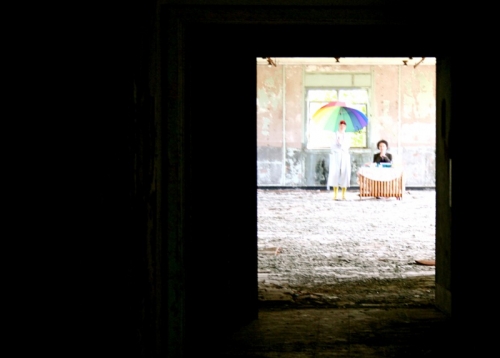
I wasn't born of a shut-in mother, and I've never been married to a cheating man. I haven't experienced the onset of dementia. I am not a recovering drug addict. And yet the main characters of my undergrad thesis were all of these and more. As one who eschews the "write what you know" cliché, I'm not alone—or that's what I gather from a recent Times article...
Read More
Dmitri Nabokov, who died last week, was more notable as an opera singer and a racecar driver than a writer, according to his Times obituary. But he was best known as the executor of his father Vladimir's estate, and as the translator of many of his Russian novels. Without Dmitri, anglophone readers might never have read Invitation to a Beheading or The Gift. And he’s given us Nabokov’s drafts for The Original of Laura, insisting as an honest executor on highlighting its incompleteness.
In honor of Dmitri, I’ve decided to round up more literary parent-child pairings—some canonical, some obscure—that have made our bookshelves fuller.
1. Kingsley Amis and Martin Amis
This duo has been unstoppable: the father was a renowned comedic novelist—Lucky Jim includes such gems as, “There was no end to the ways in which nice things are nicer than nasty ones”—while the son has been an international heavyweight from his first novel The Rachel Papers (“Erections, as we all know, come to the teenager on a plate”) to the forthcoming Lionel Asbo.
2. Samuel Taylor Coleridge and Hartley Coleridge
Admittedly, the son was very much overshadowed by his father, the great Romantic poet and compatriot of Wordsworth, but Anne Fadiman’sthorough and thoughtful essay, “The Oakling and the Oak,” makes for a fantastic and poignant read. “I have long been interested in what makes some oaklings thrive and others wither because, in a minor way, I’m an oakling myself,” the author writes, acknowledging her own filial relationship to the public intellectual Clifton Fadiman, before turning her eye back to the son who wrote sonnets and disappeared into relative obscurity.
3. Frank Herbert and Brian Herbert
Much like Nabokov and his son, Brian Herbert has followed in his father’s footsteps, writing a few science-fiction novels of his own before penning prequels and sequels to Frank Herbert’s Dune series. The desert planetArrakis, with its reserves of an extraordinarily rare spice called melange, was already well known to sci-fi enthusiasts upon Frank Herbert’s death, but his son has kept the saga alive (unlike the then young and hapless David Lynch).
4. Floyd Skloot and Rebecca Skloot
Two of America’s most brilliant nonfiction writers have taken fascinating trajectories: the father, Floyd Skloot, became an acclaimed writer of nonfiction even before suffering brain damage, and writing a memoir that articulates the experience. Meanwhile, his daughter, Rebecca Skloot, has written the runaway bestseller about “immortal” human cells, The Immortal Life of Henrietta Lacks. So, of course, the pair have co-edited the delightfully readable Best American Science Writing 2011.
5. Mary Wollstonecraft and Mary Shelley
Fathers and sons, fathers and daughters...no such list would be complete without the famous mother-daughter pair of Mary Wollstonecraft and Mary Shelley. The elder was an outspoken feminist—the author, in fact, of A Vindication of the Rights of Women—who died in childbirth. After marrying Percy Bysshe Shelley, the daughter, herself an outspokenly feminist, wrote the seminal horror novel, Frankenstein, about a man’s monstrous attempt to give birth to a living thing. Mary Shelley’s son, unsurprisingly, bore no children of his own.
Philip Larkin memorably declared, “They fuck you up, your mum and dad, / They may not mean to, but they do.” True enough, but imagine a world without Marys, Martins and Dmitris. I can only feel relief and gratitude when I reflect that the elder halves of these pairs did not follow the childless Larkin's final exhortation: "Don't have any kids yourself."
Image: Henry Fuseli, Artist Moved by the Grandeur of Ancient Ruins (1778-9). Credit: englishare.net
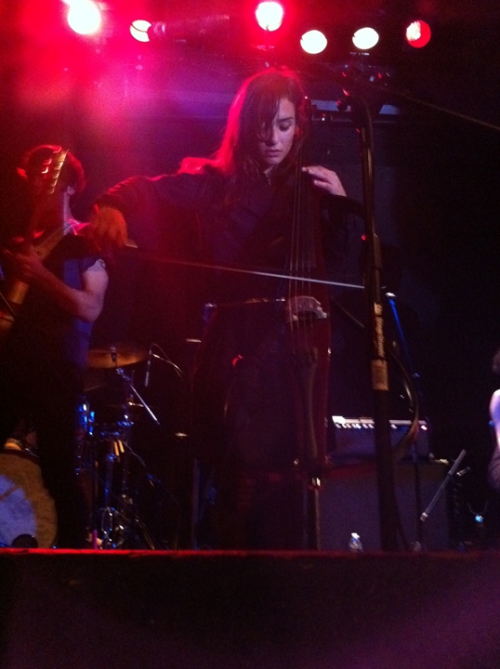
A most troubling announcement from Syracuse chamber-pop band Ra Ra Riot passed through my Facebook feed. It read, in all lowercase, "sad to say, allie is leaving the band…" There, beneath an oversaturated Polaroid, was cellist/backing vocalist Alexandra Lawn's amicable message: "not a 'goodbye.'"
Bands change members all the time; I get this. As a critic and music lover, I wonder about the shifting sound and dynamics, the old songs versus the new, unwritten ones. Particularly when that sound has intrinsic melody, like Lawn's cello, stitched into it.
Take NYC math-rockers Battles. Their instrumental avant-jams didn't really combust the hipster populace's trainers until Warp Records LP Mirrored—and specifically the single "Atlas," with Tyondai Braxton's helium-treated croon. Yet when Braxton left the band in summer of 2010, Battles' machinelike precision and groove-inducing stage presence only grew.
Cali art-rock provocateurs Xiu Xiu were a rotating cast around tortured soul Jamie Stewart for years. But multi-instrumentalist Caralee McElroy's entry in 2004 was a balm to Stewart's harsh delivery (witness the sweet, McElroy-sung track "Hello From Eau Claire"). Her departure after five years left me bewildered, beginning with "who is going to play all her gear?!" Enter Angela Seo, plugging into the crackling synths of New Wave horrorfestDear God, I Hate Myself (replete with a notorious, vomitious video). I'm relieved to say that Xiu Xiu are heavy as ever, if pounding new track "Hi" is any indication.
East Coast synth-vampires Cold Cave may have originated as "just" a solo effort by dark god Wesley Eisold, but by debut Love Came Close he'd added noisician Dominick "Prurient" Fernow and McElroy—plus created a scorching live act. Though McElroy left before second LP, Cherish the Light Years (taking the sweeter pop sounds with her), the addition of Alex Garcia-Rivera (who drummed with Eisold in Boston hardcore group Give Up the Ghost) kept Cold Cave's live sound at a bracing, post-apocalyptic froth.
But what if the change doesn't groove well? Or, more complicatedly, it alters my feelings as a fan? I'll come clean: I credit my initial openness to Ra Ra Riot to Lawn. Usually she played honeyed counterpoint to Wes Miles' bright tenor. But she sang lead on the jazz-inflected torchsong "You And I Know," sounding like she just took a slug of scotch and a three-second cigarette drag. So as I await and listen for Ra Ra Riot this year, I'm crossing my fingers for a future Alexandra Lawn solo.
Image: Alexandra Lawn (and Ra Ra Riot) at Bowery Ballroom, September 22, 2010. Courtesy the author.

Perfume Genius's second record, Put Your Back N 2 It, was released last week after some controversy surrounding the video advertisement, excerpted from the video for "Hood." YouTube and Google claimed was not “family-safe,” explaining that the two shirtless men hugging (Mike Hadreas a.k.a. Perfume Genius & porn star Arpad Miklos) gave an “overall feeling…of a more adult nature.” More than what? Nature becomes more adult. We learn that existence is to differ. Love is dark. We have 2 put our bax n2 it.
“The hands of God were bigger than Grandpa’s eyes / But still you broke the elastic on your waist […] The love you feel is strong / The love you feel is stronger / I will take the dark part / of your heart into my heart / I will take the dark part / of your heart into my heart”
—Perfume Genius “Dark Parts,” from new record, Put Your Back N 2 It, released last Tuesday on Matador
“The magical (such as it can really be called without lexical muse) ascendancy of night and of the dark, the fear of darkness also probably derive from the threat they pose to the organism/environment…darkness is not the mere absence of light; it has some positive quality. Whereas bright space disappears, giving way to the material concreteness of objects, darkness is ‘thick’; it directly touches a person, enfolds, penetrates, and even passes through him.”
—Roger Caillois, “Mimicry and Legendary Psychaesthenia,” 1937 (collected in The Edge of Surrealism)
“To exist is to differ…identity is a minimum and, hence, a type of difference, a very rare type at that, in the same way as rest is a type of movement and the circle is a type of ellipse. To begin with some primordial identity implies at the origin a prodigiously unlikely singularity, or else the obscure mystery of one simple being then dividing for no special reason.”
—Gabriel Tarde, Monadology and Sociology, 1895
"Dark Parts" Studio Recording
Interview with Perfume Genius and "Dark Parts" live performance
Let Me Recite What History Teaches (LMRWHT) is a weekly column that flashes the lavalamp, gaslight, candlelight, campfire, torch, sometimes even the starlight of the past on something that is happening now. The form of the column strives to recover what might be best about the “wide-eyed presentation of mere facts.” Each week you will find here some citational constellation, offered with astonishment and without comment, that can serve as an end in itself, dinner party fodder, or an occasion for further thought or writing. The title is taken from the last line of Stein’s poem “If I Told Him (A Completed Portrait of Picasso)."
Image (Silver Laced Polish Chicken): 4chan.

While I’m not so good at being aware of what’s going on in popular culture, somehow I'm still stubborn and adamant in my judgment of popular culture. This becomes horribly evident every year when it comes time for the Academy Awards and I haven’t seen any of the films nominated for anything, yet I insist on filling out the NYTimes Oscar Ballot along with my family and friends.
The only 2012 nominee I saw was Drive (here's me raving about its soundtrack a few months ago), which was only nominated in the category of sound editing. It did not win. My sister-in-law informed me that Glenn Close was in this film Albert Nobbs about a woman dressing as a man in the 1920s, and I proceeded to pick that film as my winner for every category for which it was nominated.
My brother found my ignorance amusing enough to actually record some of it. In his words, "Watching the 'scars with my sister is the most hilarious thing in the world. She is almost criminally ignorant of movies and popular culture in general." What follows is his edited transcript.
"The Descendants, that stupid movie about the beach?"
"The Artist...it’s fucking silent, it’s not gonna win. Well, at least it’s prestigious."
"The Help... Javier Bardem and Penelope Cruz are married?"
On The Iron Lady: "What's that, a movie about the First Lady?"
[Insert unrelated heated exchange between the Blatchley siblings:]
Kayla: "Why does everyone love Sandra Bullock? I mean, why is she even on TV?"
Response: "Well, she won the Academy Award last year."
Kayla: "What?!?! That stupid bitch won an academy award? For WHAT?"
Response: "Blindside."
Kayla: "What?! That movie about a prissy white woman who lets a black kid stay with her won an Academy Award? They don't even have sex!"
My impeccable strategy of seeing as few movies as possible landed me 4 our of a possible 24 on my NYTimes Oscar ballot. My Oscar picks are apparently not Oscar’s picks. But who is the real winner? I somehow suspect it’s me.
Image: Getty images via blog.zap2it.com
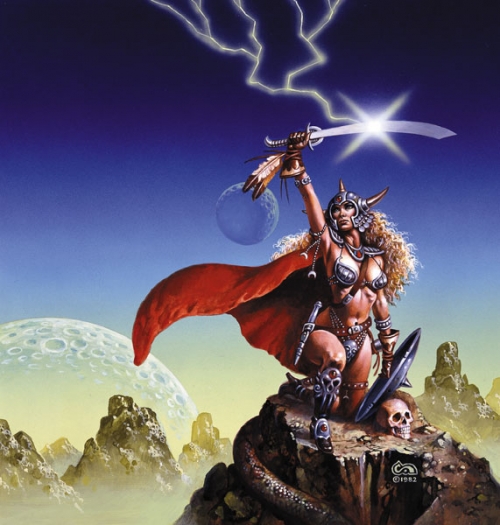
I am the first to admit that I’m not the greatest representative of the science fiction and fantasy publisher that employs me. If you’d have scanned my bookshelves prior to 2007, you might have found one fantasy novel among the hundreds. (Its title probably would have included the words "Harry" and "Potter.") But Slate's recent post about David Foster Wallace's ten favorite books reminded me of how much I've changed.
Read More
What if we could perfect the formula for tear-jerking, goosebump-inducing songs? That question has obsessed me ever since I read a Wall Street Journal article about Adele’s Grammy-minted ballad “Someone Like You.” Granted, it's a breakup song set to foreign-film piano, but it’s Adele’s “unexpected deviations” from the melody, effects known to music nerds as “...
Read More
Is there anything more darkly satisfying than an impeccably written scathing review? The bright chorus of well-read, sharply intelligent people fighting? The singular, succulent voice of just one intelligent person mocking another?
Omnivore’s Hatchet Job of the Year Prize, which seeks to recognize “the writer of the angriest, funniest, most trenchant book review of the past twelve months,” solicited my deepest appreciation and applause. And it got me wondering how else, besides the prize, the literary community could both celebrate and sex up the art of book reviewering.
Is there some way, now that the publishing world is a bit of a mess and in some ways we are now free to do what we want with it, that we could transplant book reviews into a fresher format? I would never hope to replace publications like the Times Literary Supplement or Harper’s; no, what I’m envisioning is more of a marketing platform from which such publications might allow book reviewers to become more visible.
My first ideas were unsurprisingly juvenile. They involved mud-wrestling and physical combat with comically sized props. Televised. Probably on cable. A show called Critical Takedown, where prominent literary critics could face off with best-selling authors, and snubbed writers could challenge the critics who ignored their work. Who gets the last word now, bitch? I don’t know how this could fail.
Then I thought the publishers themselves might throw critics a bone with an invention I like to call "The Sticker." What would happen is that every book that gets put on a shelf now has to bear a particular Sticker noting what a prominent critic has thought of it. Different reviewers could be identified by different colors: people would start identifying the yellow stickered books as loathed by Dale Peck (you know what they say about "all press"), bright pink means New York Magazine thinks it’s hot, etc. Stickers. We could even get that pixelly square thing to connect to full reviews on shoppers' smartphones. This idea sells itself and would never go horribly wrong.
The Omnivore’s doing a pretty stellar job of rounding up criticism, but we can do so much more. Bake sales? T-shirts with Kakutani caricatures screened on the chest? A calendar called "Authors and Kittens" and another "Go Fetch with Critics"? Maybe I am not so good at marketing. But I do think we're at a time in publishing when something great could happen. Imagine a search engine that would incorporate all lit-related web content and organize it, with the power and ease of Google, but exclusively books and uncomfortable social networking icons that intentionally degrade its users!
It could be so exciting!
image: bill37mccurdy.wordpress.com

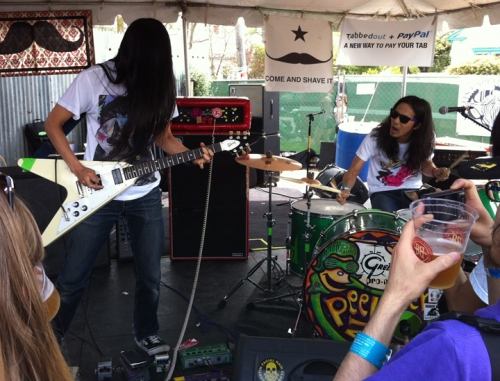

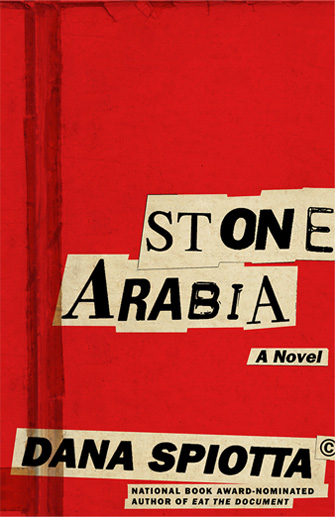





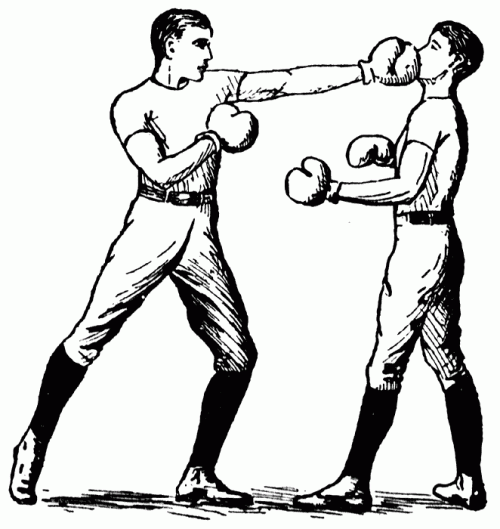



 A Black Balloon Publication ©
A Black Balloon Publication ©